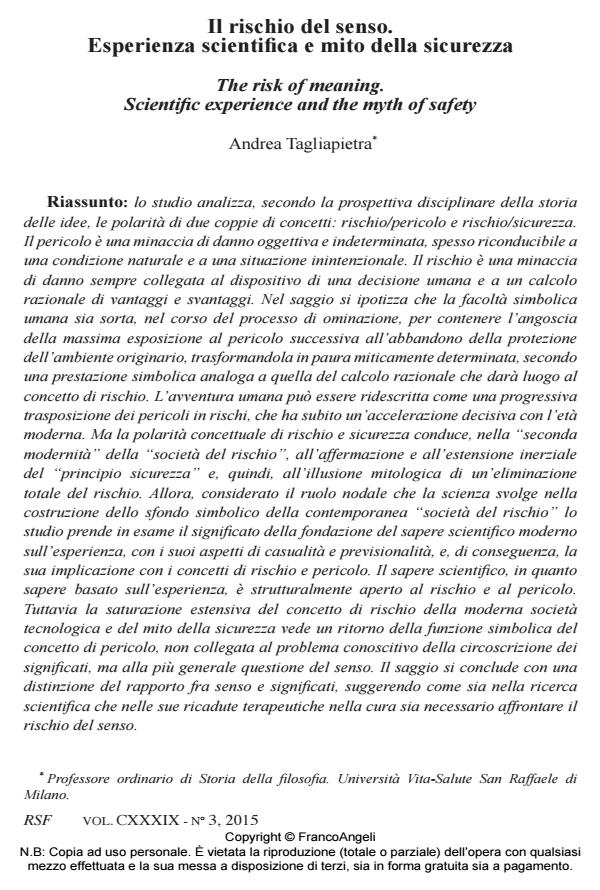Il rischio del senso. Esperienza scientifica e mito della sicurezza
Titolo Rivista RIVISTA SPERIMENTALE DI FRENIATRIA
Autori/Curatori Andrea Tagliapietra
Anno di pubblicazione 2015 Fascicolo 2015/3
Lingua Italiano Numero pagine 20 P. 9-28 Dimensione file 2235 KB
DOI 10.3280/RSF2015-003002
Il DOI è il codice a barre della proprietà intellettuale: per saperne di più
clicca qui
Qui sotto puoi vedere in anteprima la prima pagina di questo articolo.
Se questo articolo ti interessa, lo puoi acquistare (e scaricare in formato pdf) seguendo le facili indicazioni per acquistare il download credit. Acquista Download Credits per scaricare questo Articolo in formato PDF

FrancoAngeli è membro della Publishers International Linking Association, Inc (PILA), associazione indipendente e non profit per facilitare (attraverso i servizi tecnologici implementati da CrossRef.org) l’accesso degli studiosi ai contenuti digitali nelle pubblicazioni professionali e scientifiche.
Lo studio analizza, secondo la prospettiva disciplinare della storia delle idee, le polarità di due coppie di concetti: rischio/pericolo e rischio/sicurezza. Il pericolo è una minaccia di danno oggettiva e indeterminata, spesso riconducibile a una condizione naturale e a una situazione inintenzionale. Il rischio è una minaccia di danno sempre collegata al dispositivo di una decisione umana e a un calcolo razionale di vantaggi e svantaggi. Nel saggio si ipotizza che la facoltà simbolica umana sia sorta, nel corso del processo di ominazione, per contenere l’angoscia della massima esposizione al pericolo successiva all’abbandono della protezione dell’ambiente originario, trasformandola in paura miticamente determinata, secondo una prestazione simbolica analoga a quella del calcolo razionale che darà luogo al concetto di rischio. L’avventura umana può essere ridescritta come una progressiva trasposizione dei pericoli in rischi, che ha subito un’accelerazione decisiva con l’età moderna. Ma la polarità concettuale di rischio e sicurezza conduce, nella "seconda modernità" della "società del rischio", all’affermazione e all’estensione inerziale del "principio sicurezza" e, quindi, all’illusione mitologica di un’eliminazione totale del rischio. Allora, considerato il ruolo nodale che la scienza svolge nella costruzione dello sfondo simbolico della contemporanea "società del rischio" lo studio prende in esame il significato della fondazione del sapere scientifico moderno sull’esperienza, con i suoi aspetti di casualità e previsionalità, e, di conseguenza, la sua implicazione con i concetti di rischio e pericolo. Il sapere scientifico, in quanto sapere basato sull’esperienza, è strutturalmente aperto al rischio e al pericolo. Tuttavia la saturazione estensiva del concetto di rischio della moderna società tecnologica e del mito della sicurezza vede un ritorno della funzione simbolica del concetto di pericolo, non collegata al problema conoscitivo della circoscrizione dei significati, ma alla più generale questione del senso. Il saggio si conclude con una distinzione del rapporto fra senso e significati, suggerendo come sia nella ricerca scientifica che nelle sue ricadute terapeutiche nella cura sia necessario affrontare il rischio del senso.
Parole chiave:Rischio, pericolo, sicurezza, esperienza scientifica, senso, significato.
Andrea Tagliapietra, Il rischio del senso. Esperienza scientifica e mito della sicurezza in "RIVISTA SPERIMENTALE DI FRENIATRIA" 3/2015, pp 9-28, DOI: 10.3280/RSF2015-003002